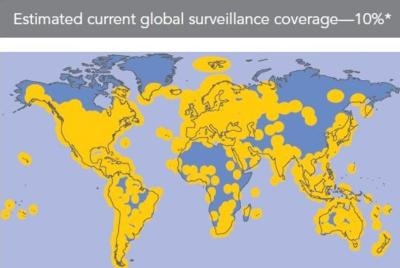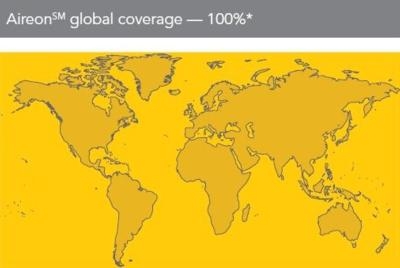Launching Aireon Joint Venture To Enhance Flight Efficiency, Safety Through A Public-Private Partnership
Air traffic management agencies around the globe will for the first time be able to continuously track aircraft anywhere in the world through a planned joint venture announced Tuesday by Iridium Communications. Aireon LLC will deliver this surveillance capability to Air Navigation Service Providers (ANSPs) around the world and their commercial airline customers through a planned joint venture between Iridium and NAV CANADA with support from the FAA and suppliers Harris Corporation and ITT Exelis. NAV CANADA, whose participation is subject to the completion of formal agreements in the near future, intends to be Aireon's first customer. Aireon will enable fully global and continuous space-based monitoring and control of aircraft, even over oceans and remote regions where it is not currently possible.

Aireon's service will use space-qualified Automatic Dependent Surveillance-Broadcast (ADS-B) receivers built into each of the 66 satellites in Iridium NEXT, Iridium's second-generation satellite constellation, to deliver this transformational capability. Iridium NEXT satellites are scheduled to launch from 2015 to 2017, and will provide this capability as the new satellites are commissioned, with full service expected by 2017. Aireon's new offering will enable commercial airline operations to be more efficient, safer and more environmentally friendly.
Today the world is divided into Flight Information Regions where ANSPs safely manage aircraft within their designated coverage areas. For example, across the heavily traveled North Atlantic, the FAA, NAV CANADA and NATS in the UK manage traffic between points in Europe and North America but need to keep aircraft widely-spaced in part because of the lack of radar visibility over oceanic airspace. Aireon will provide complete visibility to all aircraft everywhere, helping ANSPs decrease inefficiencies. NAV CANADA is ideally suited to be a partner in Aireon since it manages the second largest air navigation service in the world by traffic volume. In its North Atlantic operation, NAV CANADA provides air traffic management for 1,200 flights per day -- the busiest oceanic airspace in the world. NAV CANADA operates one of the world's most advanced oceanic air traffic management systems, and has been a pioneer in the use of ADS-B over remote areas and now into the North Atlantic through ADS-B ground stations
over Hudson Bay, the Eastern Arctic and Greenland.
"I am excited that Iridium will once again be able to use its unique global satellite network to expand connectivity beyond the limitations of ground-based systems," said Matt Desch, CEO of Iridium. "Just as we opened the world of personal communications far beyond the ten percent of the Earth's surface that is covered by terrestrial networks, we are now extending the reach of land-based aircraft tracking systems. This is a big milestone for commercially hosted payloads and it will be a ground-breaking use of Iridium NEXT. Iridium is the only company with the capability and reach to enable this, and we are thrilled that our service will make air travel more efficient and safer. Aireon is truly revolutionary."
For Iridium, Aireon is the product of its multi-year commitment to establish an innovative use of the hosted payload capability that will be available on Iridium NEXT. The ADS-B 1090 MHz Extended Squitter (ES) receivers on every Iridium NEXT satellite will complement ground-based air navigation systems currently in use by seamlessly relaying, in near-real time, position and status information of aircraft flying over oceans, poles and remote regions to air traffic controllers on the ground. This new capability will extend the benefits of current radar-based surveillance systems, which cover less than 10 percent of the world, to the entire planet. The Iridium NEXT constellation, a low-Earth orbiting (LEO) system of inter-linked satellites, is the only system that will be able to seamlessly provide ADS-B coverage globally.

Multinational mandates already require commercial aircraft to be fitted with ADS-B transmitters. Given that such upgrades are already underway (and required to be completed in U.S. airspace by 2020 as part of the FAA's NextGen initiative), Aireon will enable air carriers to maximize returns on billions of dollars in aircraft avionics upgrades they are already making without the need for any additional onboard equipment. They will benefit from improved climb profiles, more flexible routing, and more efficient use of airspace -- saving substantial fuel and time on oceanic routes.
"NAV CANADA and other ANSPs around the world have made significant progress in our efforts to enhance flight efficiency in oceanic airspace using today's technologies and procedures; however, there are still significant limitations due to the absence of viable surveillance over most of the world's oceans," said John Crichton, president and CEO of NAV CANADA. "These limitations ultimately waste fuel and increase carbon emissions, despite the best efforts of air traffic services personnel. Aireon will enable a quantum improvement. For that reason, NAV CANADA aims to be a major user of this new ADS-B capability, starting with the busy North Atlantic airspace. Furthermore, we feel that this Iridium innovation is so important to the future of air traffic management -- with significant transformative potential -- that we have decided to become a partner in this venture, subject to the completion of formal agreements."
In the U.S., the FAA has been working with Iridium and the Aireon team over the past year to evaluate the capabilities of space-based ADS-B systems.

Aireon will deliver significant value to both public and private stakeholders in the global aviation community. Planned benefits delivered by Aireon will include:
- Operational Cost-Savings -- Through optimal routing and increased capacity, Iridium estimates that Aireon will enable airlines to save approximately $6-8 billion in fuel costs just on their North Atlantic, and North and Central Pacific, routes over the initial 12-year period from when Aireon becomes operational in 2018.
- Lower Environmental Impact -- Optimal routing, whereby planes are enabled to climb rapidly to, and fly longer at, more efficient altitudes and in better weather conditions, could reduce carbon emissions significantly. When fully operational, Iridium estimates that Aireon could save the carbon equivalent of removing approximately two million cars off the road annually.
- Extended Operational Safety -- For the first time ever, continuous global surveillance will allow ANSPs to extend safety benefits in air travel to all airspace globally. Aireon will make the air traffic control capabilities of ADS-B, the technology underlying the U.S. and Canada's next-generation air traffic management upgrade programs, available to all nations -- large and small -- broadening safety in regions of the world that have not yet implemented ADS-B.
Exelis has been the systems engineering provider for Aireon and has extensive experience collecting and providing air traffic information as the operator of the FAA's ground-based ADS-B system. Harris Corporation has been selected as the payload provider for Aireon after an extensive, competitive process. Leveraging more than 50 years of space experience and a close relationship with the FAA, Harris will provide 81 space-qualified ADS-B receivers to fly as hosted payloads on Iridium NEXT, including in-orbit and ground spares. (Images provided by Aireon)
 ANN's Daily Aero-Term (04.14.24): Maximum Authorized Altitude
ANN's Daily Aero-Term (04.14.24): Maximum Authorized Altitude ANN's Daily Aero-Linx (04.14.24)
ANN's Daily Aero-Linx (04.14.24) Classic Aero-TV: 'We're Surviving'-- Kyle Franklin Describes Airshow Life 2013
Classic Aero-TV: 'We're Surviving'-- Kyle Franklin Describes Airshow Life 2013 Aero-News: Quote of the Day (04.14.24)
Aero-News: Quote of the Day (04.14.24) Airborne 04.09.24: SnF24!, Piper-DeltaHawk!, Fisher Update, Junkers
Airborne 04.09.24: SnF24!, Piper-DeltaHawk!, Fisher Update, Junkers





